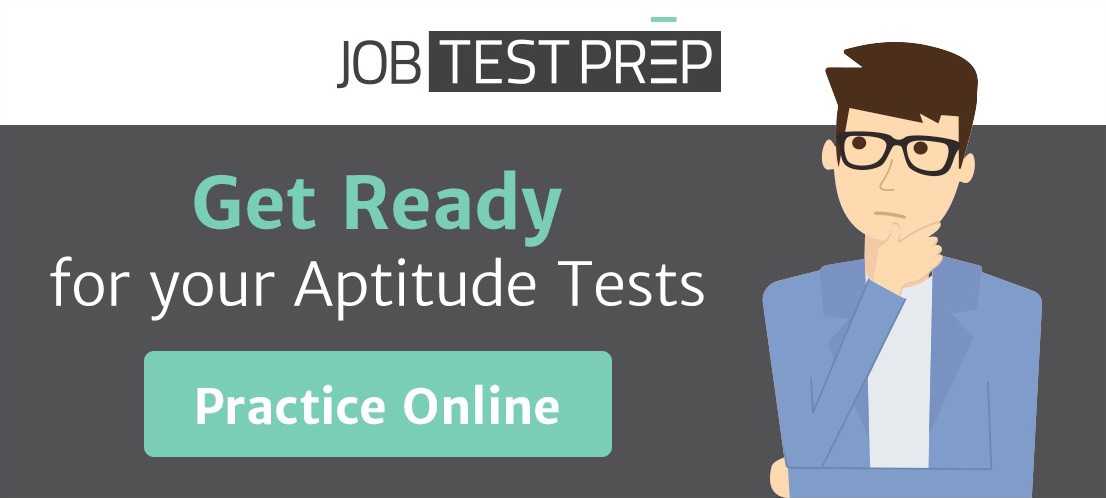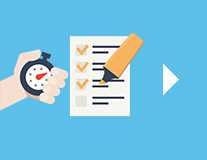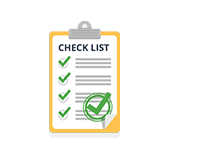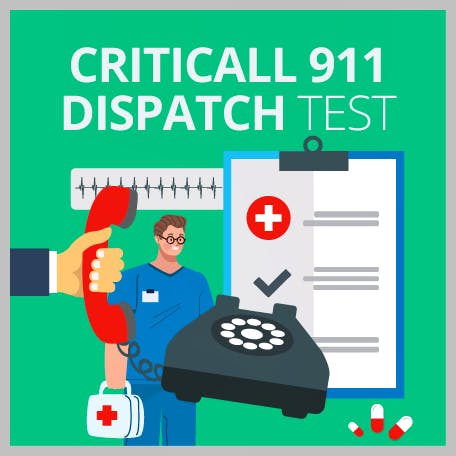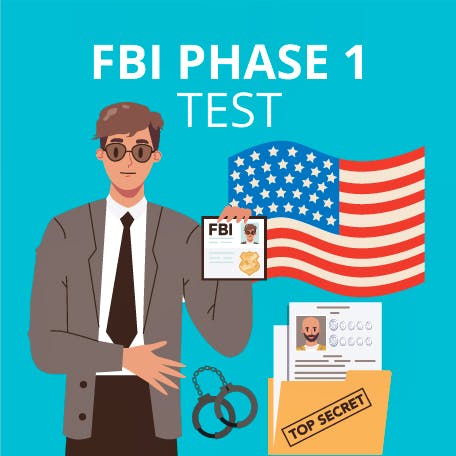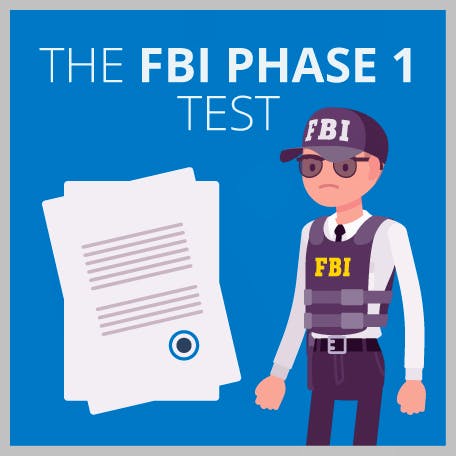A Guide to the Police Psychological Exam: Examples & Tips
Updated November 18, 2023
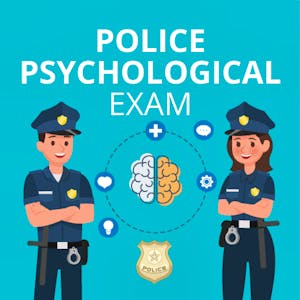
- What Is the Police Psychological Exam?
- What Is Being Assessed Within the Police Psychological Exam?
- What Specific Traits Will Be Assessed Within the Police Psychological Test?
empty
empty
empty
empty
empty
empty
- What Format Is the Police Psychological Test?
empty
empty
- What Is the Pass Mark for the Police Psychological Test?
- Police Psychological Practice Test Questions
- How to Prepare for the Police Psychological Test
- Frequently Asked Questions
- Final Thoughts

The police psychological exam is a crucial part of the hiring process for law enforcement agencies. It is a personality test that confirms how suitable an applicant is for working in the police. The police psych test is used by most law enforcement agencies across the United States, although key details may differ from state to state.
What Is the Police Psychological Exam?
The police psychological exam is a series of tests and assessments administered to individuals who are seeking to become police officers.
The purpose of the exam is to evaluate a candidate's psychological fitness for the job and identify any potential psychological issues that may interfere with the candidate's ability to perform police work.
The psychological evaluation for police officers typically consists of a written test and an interview with a licensed psychologist or psychiatrist who specializes in police psychology. The evaluation process is as follows:
- The written test may include questions related to the candidate's personal history, as well as their knowledge of law enforcement procedures and protocols.
- The interview will cover topics such as the candidate's communication and interpersonal skills, ability to handle stress, emotional stability, and decision-making skills.
The results of the police psychological screenings are used to determine whether a candidate is suitable for a career in law enforcement.
In some cases, the results may indicate that a candidate needs further evaluation or treatment before being considered for employment as a police officer.
Therefore, a police psych exam is an important tool for ensuring that police officers are mentally and emotionally prepared to handle their job's demanding and often stressful nature.
In this article, you’ll learn more about what potential candidates can expect from the police psychological test.
What Is Being Assessed Within the Police Psychological Exam?
As the police psychological assessment is a comprehensive evaluation of an individual's mental and emotional fitness to become a law enforcement officer, the assessment needs to be comprehensive.
It needs to look at a wide range of facets that will confirm that a potential candidate can cope with the rigors of day-to-day life as a police officer.
It is not an aptitude test. Instead, you will be assessed on various personality traits, motivational drivers, attitudes towards work and society, and general values.
When questioned holistically, the scope of these elements will give the recruiter (and the candidate) a detailed insight into their potential.
What Specific Traits Will Be Assessed Within the Police Psychological Test?
Hiring managers will be looking to identify a wide range of traits within the exam. This will depend on how you answer questions.
Broadly speaking, you can expect to be quizzed on areas relating to the areas listed below.
Personal Responsibility
Can you accept the standards expected by societal norms, as well as state and federal expectations?
Can you suitably follow those standards, and can you ensure that you do not blame others if or when those standards are not followed correctly?
Impulse Control
How do you control yourself in pressurized situations? Can you demonstrate how much time it takes to think through your available choices, and how can you show that you make rational and informed decisions, rather than acting on impulse?
Emotional Resilience
Law enforcement is a highly stressful career choice, and police officers need strong emotional resilience to cope with the wide range of situations and scenarios they face.
You will be quizzed on how you can adapt to stressful situations without experiencing any long-term damage or difficulties to your mental or physical health.
It's worth reiterating that the police psych test will never be about checking your sanity. But it's about making sure you can protect yourself in some of the most challenging scenarios.
Emotional Intelligence
Are you aware of your emotions? How can you handle your emotions when in challenging scenarios, and can you highlight how you positively interact with others?
Stress Management
Can you manage your stress carefully? Again, this may link in with emotional control.
When working in challenging situations, you must be calm and rational, rather than driven by your stress levels.
Conscious and Unconscious Bias
You need to be able to show that you can treat everyone equally and fairly. Therefore, it's essential to be quizzed on your conscious and unconscious biases.
What Format Is the Police Psychological Test?
Now you know what the police psych test is looking for, let's look at the specific format of the exam.
The exam has two parts:
- A written questionnaire and multiple-choice psychological tests
- Followed by a face-to-face meeting with an experienced psychologist.
The Written Test
You can expect to be provided with a series of short statements. Then, you will be asked to rank them on a scale of ‘strongly disagree’ to ‘strongly agree'.
Within just 15 minutes, you can expect to be asked up to 100 questions.
Typically, the standardized exam will take place on the computer, but sometimes, you could request paper and pencil instead.
The Face-to-Face Interview
Throughout the course of the oral interview, topics such as your past, employment history, academic accomplishments, medical difficulties, and mental health conditions, such as depression, may come up for discussion.
What Is the Pass Mark for the Police Psychological Test?
There is no academic pass rate for the police psych exam.
Instead, it focuses on the quality of your answers. You need to demonstrate that you have the right personality match for a career in law enforcement.
Typically, your score will be assessed by a psychologist who will judge you in three ways:
- Low risk or acceptable risk
- Medium risk or marginal risk
- High-risk or unacceptable risk
The law enforcement agency will usually take the recommendation of the psychologist based on the above categories.
If you do pass the test, you will be very likely to receive a conditional offer of employment.
If you fail the test, you must disclose your failure in any other application to work in a law enforcement agency. This is why it's so important for candidates to prepare for the police psychology test and pass it the first time around.
Police Psychological Practice Test Questions
If you're feeling daunted by the prospect of the exam, let's take a look at some practice police psychological exam questions and answers.
1. I like to keep all my belongings in one place, so I know where to find them when I'm looking for them.
a) Strongly agree
b) Agree
c) Neither agree nor disagree
d) Disagree
e) Strongly disagree
2. People turn to me in a crisis because they know that I am a natural leader.
a) Strongly agree
b) Agree
c) Neither agree nor disagree
d) Disagree
e) Strongly disagree
3. I am always in control of my impulses.
a) Strongly agree
b) Agree
c) Neither agree nor disagree
d) Disagree
e) Strongly disagree
4. I always see the best in people.
a) Strongly agree
b) Agree
c) Neither agree nor disagree
d) Disagree
e) Strongly disagree
5. I can become overwhelmed in stressful situations.
a) Strongly agree
b) Agree
c) Neither agree nor disagree
d) Disagree
e) Strongly disagree
If you need to prepare for a number of different employment tests and want to outsmart the competition, choose a Premium Membership from JobTestPrep.
You will get access to three PrepPacks of your choice, from a database that covers all the major test providers and employers and tailored profession packs.

How to Prepare for the Police Psychological Test
Unlike traditional academic tests, preparing for the police psych tests isn't about learning facts or figures.
It's also not about learning technical skills or practical capabilities. This means that there isn't any revision in the traditional sense of the word that you can do.
But that doesn't mean you can't prepare for the exam.
Let's find out more – below are some step-by-step police psychological exam tips.
Step 1. Research Is Essential
Different states will have quite different requirements when it comes to the police psych test. There is no standardized exam that is used across the entire US.
Your first step is to research exactly what to expect from the police psychological exam in your state. For example, you can learn about what type of test they use, whether they use face-to-face interviews, and how long your test is expected to take.
You should also research the role itself. What duties and responsibilities will you be expected to carry out?
From here, you can start to build a perception of the personality type that matches the role.
By being clear about what sort of person the police are looking for, you can get a deeper insight into the answers that they may expect to see.
Step 2. Sit Police Psychological Practice Tests
Again, this isn't about learning specific skills; instead, it is about creating expectations, so there are no surprises on test day.
Sites such as JobTestPrep offer a series of police psychological exam practice tests that you can use to scope out the types of question you may be asked.
It's about learning how to read the question properly – for example, with the ranking scale, you may find that the answers are switched up, so you could think that you are answering ‘strongly agree,’ but you could be inadvertently answering ‘strongly disagree.’
Step 3. Check Your Timings
The exam is a timed exam, although the specific time may change from state to state. Therefore, during your practice, focus carefully on your timings.
For example, if you are expected to answer 100 police psych exam questions in just 15 minutes, how long will it take you to answer each question?
For slow readers or those who like to take their time to think about their answers, you could be disadvantaged if you've not completed the entire exam in the allotted timescale.
Step 4. Think About Your Personality
During your research, have you identified any compelling reasons why you may not be suited to the role?
For example, perhaps you have some conscious biases that you know aren't appropriate for a role in career enforcement.
Be honest about yourself. If you struggle in large crowds or you are an introverted personality, would you be able to cope in a crowd control situation?
Do you have the natural authority to make someone sit up and listen to you, or do you prefer to fade into the background?
There are zero criticisms of these personalities, but you may find that those traits could be better suited to other roles within law enforcement.
Being aware of your own personality is a strength and will give you a better chance to make sure you're working in the right career for you.
Step 5. Answer All Police Psychological Test Questions and Interviews Honestly
In the police psych tests, your answers will be reviewed by a psychologist. That person will be actively looking for 'hidden questions' and 'built-in triggers,' both of which are designed to determine whether or not you are being open and honest.
If the psychologist has the impression that you are trying to conceal something, it will significantly impact your final score.
It is in your best interest to answer any questions (written or oral) as honestly as you can.
Through the use of the police psychological exam, law enforcement agencies are able to identify whether or not candidates are able to successfully manage the specific stresses that police officers are exposed to throughout the course of their careers.
The police department will use the police psychological exam to determine whether or not a candidate is mature enough, responsible enough, and emotionally stable enough to handle the difficulties that they may face on a daily basis in their job as a police officer.
It's not hard to pass in that it's not a yes/no exam with an academic scoring system. Instead, it's an exam that looks at your personality and your potential to cope with the job at hand.
If you do pass the test, you will be highly likely to receive a conditional offer of employment.
If you fail the test, you will have to disclose your failure in any other application to work in a law enforcement agency.
To pass the test, you need to accurately demonstrate that you have the right capabilities and personality type of coping with day-to-day life as a police officer. In addition, you need to focus heavily on the job role itself and learn what to expect, as well as research what type of person you need to be to succeed.
You must, however, be honest and truthful in your answers. The test is designed to spot the signs of people telling falsehoods, and any suggestion of a lie will negatively impact your score. Therefore, your best bet is to be honest and truthful in all the answers.
Research what is expected in the exam in your state. Different law enforcement agencies have different criteria, so make sure you are aware of what to expect.
You should also research the job role and the personality type required and undertake practice test papers to familiarize yourself with the style of questioning.
Not only will this help you to set your expectations, but you can practice any timings and give yourself the best possible chance of success. You can also take paid or free police psychological exam practice tests online.
There are two key aspects of a police psych test. First, it starts with the written exam and is followed up with a face-to-face interview with a psychologist.
Typically, you can expect the written exam to last 15 minutes, while the face-to-face interview may last up to one hour.
However, different states have different requirements, so you should always check the details with your local law enforcement agency.
It's always worth checking practice police psychological interview questions online so you can prepare for the test in advance.
Sites such as JobTestPrep offer packages that allow you to prepare in full before test day, helping to improve your chances of success.
The exam will feature an in-depth interview with a psychologist, so what you wear and your body language are just as important as your answers.
It would help if you aimed to dress professionally and appropriately for the experience. Replicating the uniform for a police officer is always a good bet, so a dark suit and tie for a man or a formal blue outfit for a lady could be appropriate.
The best thing you can do is to dress conservatively and look neat and tidy.
The police psych test is a screening test within the recruitment phase for law enforcement agencies. Therefore, it is natural for at least 15 to 20% of applicants to fail the exam because they don't have the right personality type for the job role.
The purpose of the police psychological exam is to determine whether or not an applicant can deal with the high levels of pressure that come with a job in law enforcement.
It assists law enforcement in determining whether you are mentally strong enough to cope with the potentially violent nature of the role, the long and stressful working hours, and whether you can handle the crime scenes that you may encounter.
Final Thoughts
The police psychological test is an essential component of the hiring process for law enforcement, because recruiters need to be confident that applicants can handle the rigors of the role.
It's not a pass-or-fail scenario – it's a confirmation that you are suited to the position. It's about protecting applicants so that they are capable of the role and have enough emotional resilience and intelligence to cope.
The test is important – as a screening tool, as much as 20% of applicants will fail the exam. Moreover, if you do fail, you will need to disclose that failure in any potential future job applications for law enforcement, and this could count against you. Therefore, success first-time is preferable.
Although there's nothing specific to revise, the best way to handle advance preparation is to use police psychological test sample questions and papers to become familiar with the format. In addition, you should evaluate your own characteristics and habits before the day of the exam and answer all the police psychological test questions honestly.

